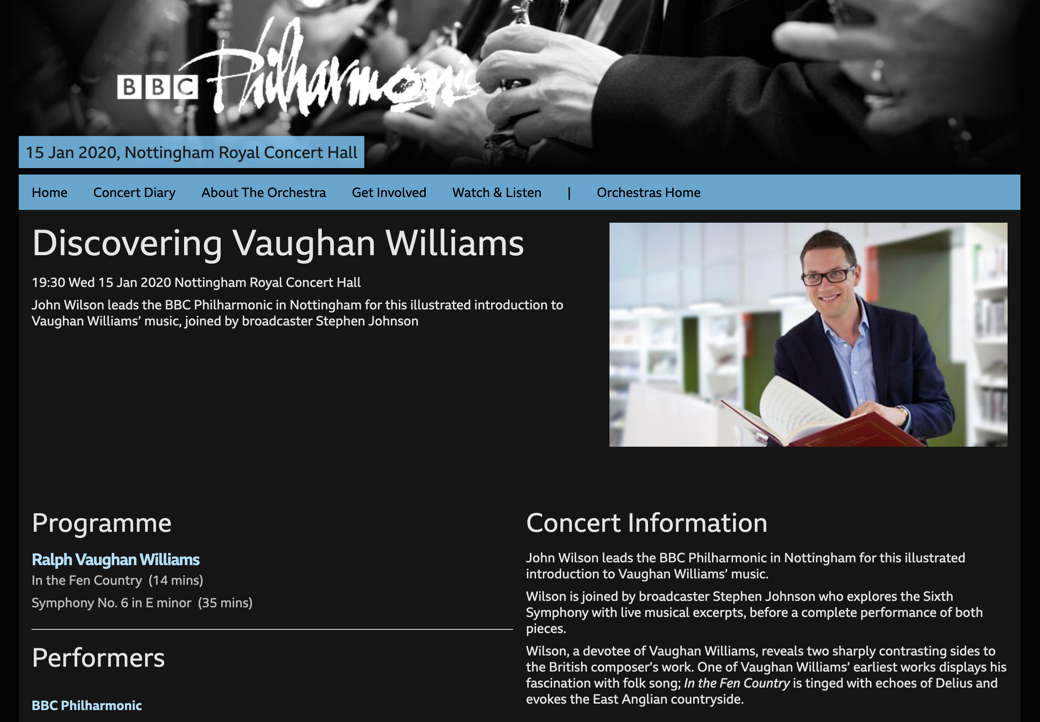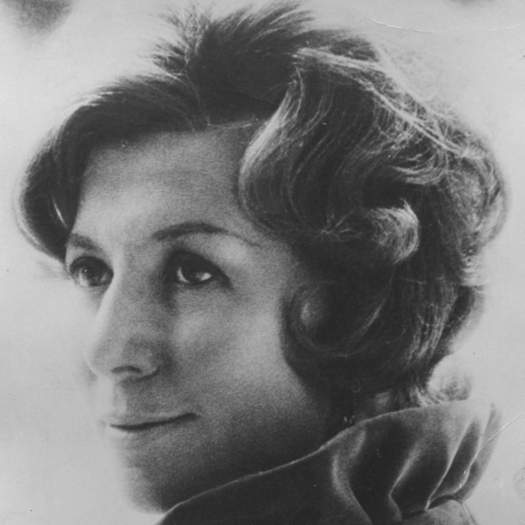 UPDATES: There's a new feature every day at Classical Music Daily. Read about the various ways we can keep in touch with you about what's happening here.
UPDATES: There's a new feature every day at Classical Music Daily. Read about the various ways we can keep in touch with you about what's happening here.
Vaughan Williams and Jazz?
MIKE WHEELER listens to
a talk from Stephen Johnson, and to
two works by Vaughan Williams played by
John Wilson and the BBC Philharmonic Orchestra
Vaughan Williams and jazz? Well yes, the signs are there in his Sixth Symphony. Without labouring the point, Stephen Johnson left us in no doubt about the connections as he talked us through the work in his latest Discovering Music presentation, with the BBC Philharmonic Orchestra and conductor John Wilson providing the usual live illustrations - Royal Concert Hall, Nottingham, UK, 15 January 2020.
Before he began, Wilson and the BBCPO played the big theme from the end of the first movement, in all its billowing splendour. It could, Johnson observed, be a sea song or, as a friend of his commented, background music in a National Trust gift shop. But, as he was at pains to point out, it's a rare moment of calm in Vaughan Williams' most turbulent symphony.

Online BBC publicity for the Discovering Vaughan Williams event in Nottingham, with an inset photo of conductor John Wilson
Taking us back to the work's opening, he emphasised the stark conflict between E minor and F minor, and went on to describe the second movement as a 'weird nocturnal route march', its 'ta-ta-ta' figure recurring 'like a nervous tic'. The join into the Scherzo he compared to a 'dive into churning white water', and suggested a parallel with the phrase 'burst like a ruthless force', from one of the Walt Whitman poems Vaughan Williams set in his 1936 cantata Dona Nobis Pacem.
The Scherzo itself, Johnson suggested, evoked the dance halls of 1940s London with 'black irony' - irony in Vaughan Williams: another unexpected insight. The tenor saxophone solo in the equivalent of a trio section was, the composer admitted privately on one occasion, a conscious nod to band-leader Ken 'Snake-hips' Johnson, killed mid-performance in an air-raid in 1941. This, of course, is the most obvious jazz-flavoured passage in the symphony; there are plenty in the rhythmic language of the first movement as well.
After the third movement's 'dance hall in hell' comes 'the biggest surprise of all in this symphony of surprises', a ten-minute, uniformly slow, quiet Epilogue, with its fade-out ending like an 'unconsoling Amen'. Johnson quoted composer Rutland Boughton's description of it as an 'agnostic's Paradiso', and Vaughan Williams' own reference to Prospero's speech in The Tempest, ending 'We are such stuff as dream are made on and our little life is rounded with a sleep'. Some of the symphony's early listeners tried to make sense of this enigmatic conclusion by turning to images of war-ravaged landscapes (the work was completed in 1947). The composer was having none of it, rightly asserting that such imagery is too limiting. He would, Johnson said, 'have wanted it to speak to us now' in any number of ways.
To end the first half of the evening, Wilson and the BBCPO played one of Vaughan Williams' earliest orchestral works, the tone poem In the Fen Country. It shows the composer on the cusp of finding his mature voice, and there are even small musical links with the Sixth Symphony, not least the passage for solo strings near the end. It could so easily be allowed to meander aimlessly, but Wilson knows better, and refused to let it sag. But there was no lack of atmosphere, the opening cor anglais and viola solos were full of character, and the final viola solo made for a haunting postscript.
The Sixth Symphony itself took up the second half, erupting with furious energy. Wilson's tempi were on the fast side but, with the possible exception of the second movement, they felt exactly right. The slashing accents packed a real punch, and the first movement's big tune swelled proudly while at the same time having a provisional quality.
While the second movement would have benefited from being just a notch slower, there was still an insistent nagging air to the 'ta-ta-ta' figure. The quiet string passage punctuating the searing wave of climaxes was made to sound almost creepy.
With the third movement's hysteria bordering on panic, the BBCPO displayed a level of collective virtuosity that turned it almost into a concerto for orchestra. Accents snapped fiercely, and the tenor saxophone solo had just enough suggestion of swagger.
That strange finale still sounds as eerie as it must have done when it was new. The floating lines seem to be directionless, but there is a disciplined structure to the textures, and the performance reflected that, while still preserving the sense of unfathomable mystery. The playing was tautly but sensitively controlled, the tremolando string passage barely rising even to a whisper.
Edgy, restless, angry - we diminish Vaughan Williams immeasurably by confining him inside that National Trust gift shop.
Copyright © 27 January 2020
Mike Wheeler,
Derby UK

FURTHER INFORMATION: RALPH VAUGHAN WILLIAMS
FURTHER INFORMATION: BBC PHILHARMONIC ORCHESTRA



